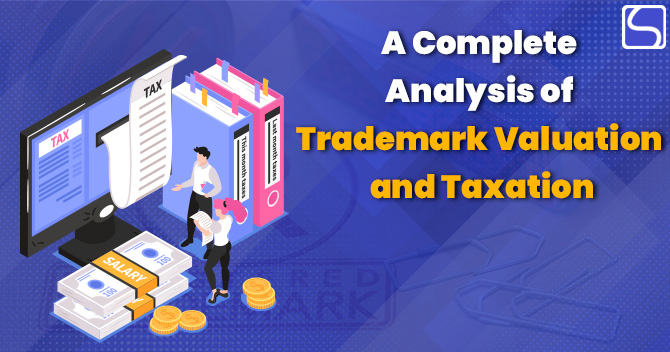A Complete Analysis of Trademark Valuation and Taxation

Karan Singh | Updated: Mar 29, 2022 | Category: Trademark
A Trademark is a unique mark or logo linked with products or services of a company, business, or individual. Trademark means a mark or brand including symbol, shape, colour, packaging of products, etc. Basically, Trademark helps to graphically represent and differentiate the products or services of one individual from another. It’s a set of rights that gives exclusive use to the owner and creates goodwill for the products or services with which it is associated. In this blog, we will discuss Trademark Valuation and Taxation.
Trademark is the face of the business and it has a high economic value. Being so powerful, Trademarks carry great commercial importance and financial value in any business establishment. Like any other IP, a registered Trademark owner has the option of transferring the Trademark rights to a 3rd party, just like transferring a tangible party in someone else’s name. Therefore, a Trademark that is a solid intangible asset for a business venture can be sold, franchised, pledged, or assigned to someone else. Now let’s discuss Trademark Valuation and Taxation.
Table of Contents
What is Trademark Valuation and Taxation?
- Trademark Valuation: When it comes to purchasing or selling an asset, the first course of action to be taken is to determine the value of the respective property. The Trademark Valuation is mainly of pivotal importance, as intangible assets are often priced sky-high than tangible assets. The valuation is usually arriving at a price at which the seller aims to sell & the buyer is ready to buy or purchase.
As far as the valuation of the Trademark is concerned, the process is more complex than it seems to be. Sellers often discover themselves in a fix for two reasons:
- To ascertain the correct Trademark value at hand;
- To determine their prospective buyers who will be keen to buy it at the ascertained price.
Hence, arriving at the correct Trademark Valuation is of great significance to any business establishment and it is carried out for completing 3 main purposes:
- For the purpose of the transaction, where problems pertaining to taxation are excluded;
- Purposes concerning taxation;
- Purposes concerning financial accounting.
Different Methods of Trademark Valuation – Trademark Valuation and Taxation
While there are different methods to arrive at the Trademark value, the following are the different approaches:
- Market-Approach Method: Trademarks in the market that are identical to the one that has to be assessed are examined & compared to arrive at the value. Here the market data concerning selling, buying, franchising, etc., are studied to arrive at a solution. For example, if a Trademark from an identical brand in the business is sole for Rs. 1 lakh, that value is taken as the benchmark value for arriving at the valuation of the Trademark at hand.
- Relief from Royalty Approach: The valuation of Trademark has arrived at one of the bases of the presumed royalty savings towards the respective Trademark. Details regarding the royalties accrued by the Trademark or identical Trademarks & all supplementary earnings brought forth by the Trademark can be used to evaluate the value of the Trademark.
- Cost Approach Method: This approach involves listing the cost incurred at the time of creating & designing the Trademark. The cost also comprises the expenses accrued in marketing & advertising the brand. This is one of the most standard methods of arriving at the economic value of the Trademark. The major drawback with this approach method is that it fails to bring in the value associated with the goodwill the Trademark carries. Yet, this method can be engaged in valuing Trademarks that are relatively new in the market.
- Future Income Approach: This is one of the most preferred & viable methods for arriving at the financial value of a Trademark. Here an in-depth examination is carried out to get the figure of the upcoming income that the Trademark would fetch over the years to come based on its existing value. Say the Trademark earns a turnover of Rs. 2 crores/year, then the value for the years to come is estimated using this existing value, and the same is discounted to the current date to fix the Trademark Valuation.
Trademark Taxation Aspects in India – Trademark Valuation and Taxation
The tax treatment on intangible assets that comprise Trademarks in India is given and discussed below:
- Business Income/Capital Gains: In the case of M/S Mediworld Publications Pvt. Ltd. vs Income Tax Commissioner, 2011, the High Court of Delhi held that the profit or income generated from the transfer of an intangible asset, i.e., Trademark & Copyright, is in the capital gains’ nature and not business income thus taxable. The court clarified that a capital asset under Section 2(14) of the IT Act, 1961[1], can be implied to be inclusive of IP.
According to Section 2(11) of the IT Act, Intellectual Property (IP) would be considered as an intangible asset that serves as a means for earning profit. It further held that the sale of an intangible asset serves as a means for earning profit. It further held that the sale of an intangible asset like a Trademark would be covered by the proviso mentioned under Section 28(VA) of the IT Act.
- Cross-Border Use of IPR: One of the biggest issues regarding the Trademark Taxation arises from the cross-border use of IPR. It involves MNCs or Multi-National Companies licensing their subsidiaries located in different countries. These subsidiaries may sub-license the Intellectual Property Right to 3rd parties functioning locally. The companies owning the Intellectual Property Right may be established in a low tax country. They may charge royalties against the subsidiaries located in a high tax nation to avoid large tax cuts.
In the instance of Commissioner of Income Tax vs Maruti Suzuki India Ltd., the Delhi High Court passed a judgement on the transfer pricing aspect in the case where the promotional efforts of an associated entity significantly increase the Trademark value that is legally owned by another entity. In this instance, the question is whether the income generated by the Trademark was to be attributed to the Trademark owner or the affiliated entity registered in India.
Location of an Intangible Asset – Trademark Valuation and Taxation.
The identification of the location of a property is needed for taxation purposes. However, the identification process of the location of intangible property is complicated. In concurrence with international principles, the Delhi High Court held that the location of the respective property owner would be considered the location of an intangible asset, regardless of it being registered in India.
The court reached this conclusion via a strict interpretation of Section 9 of the IT Act. The court held that the non-inclusion of Intellectual Property Right under the provisions of Section 9 clearly denote the intent of legislature not to tax IPR owners situated outside India even when they earned profits in India through their respective Intellectual Property Rights.
Conclusion
The importance of Trademark Valuation and Taxation is on the rise. The differences that exist in different jurisdictions make it more complex for entities having engagements or transactions worldwide to reach a middle ground for ensuring their compliance with tax regulations. Such differences may also lead to double taxation
Read our Article:How Can You Check if a Logo is Trademarked in India














